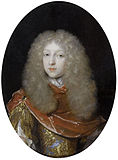Hereditary Prince

In ruling princely families , the title Hereditary Prince or Hereditary Princess refers to the child who is intended for the inheritance and legal succession of the ruler ( presumption ), while possible siblings are not taken into account. When an Hereditary Prince is married , his wife receives the title of Hereditary Princess . In imperial and royal families , the intended heir to the throne is referred to as the crown prince , the heir to the throne as the crown princess .
German history
The noble title Prince referred to the abolition of class privileges of the nobility and the Erstgeburtstitel (Primogeniturtitel) by the Weimar Constitution in 1919 to the inheritance of a sovereign or unable magnificent royal house in the first place standing prince or agnates often, the (according to the old Frankish law Salic direct in patrilineal primogeniture ) oldest male relatives, usually the firstborn (or eldest) son of the ruler. Since 1920, the noble first-born title Hereditary Prince can no longer be inherited and, according to the applicable naming and civil status law, no longer become part of a civil name in the Federal Republic of Germany.
In representations of the descendants of former aristocratic families and in publications by the German aristocratic associations, it is still used in the historical- genealogical sense and from family tradition, but has neither name nor civil law meaning. In the context of private, so-called house law regulations, the formerly sovereign (grand) ducal houses of Hesse , Baden and Anhalt as well as 55 formerly sovereign or mediatized “Princely Houses” still use.
The hereditary prince of an electorate bore the special title of electoral prince . The nobility title Hereditary Prince was used until the end of the imperial corporate state in 1918 especially for the heirs to the throne in princely and (grand) duchies as well as in margraviate and rural counties , in order to be able to distinguish them from the other sons born after them, who often because of enfeoffments "to the whole." Hand “all had the same title. If the prince title was only given as a purely first-born title or as a personal title and the descendants of the house were not allowed to use princely titles (they remained just counts ), the eldest son was often referred to as hereditary count .
- Hereditary Prince
Ferdinand Maximilian of Baden-Baden (1625–1669)
Friedrich August of Saxe-Eisenach (1663–1684)
Wilhelm Gustav of Anhalt-Dessau (1699–1737)
Other countries
The heir to the throne of the Principality of Liechtenstein , currently Alois von und zu Liechtenstein , still holds the German title Hereditary Prince , his wife Sophie von und zu Liechtenstein, Countess zu Rietberg the title Hereditary Princess .
Hereditary Duke
The heir of a (grand) duke was often referred to as heir ( great ) duke to emphasize his superior position. In Austria all the princes of the house - whether in the first place of the line of succession or not - carried the same title as the ruling monarch, namely that of archduke ; however, the ruler was generally referred to as the Archduke heir to the throne . The heir to the throne of Luxembourg also bears the title of Hereditary Grand Duke .
literature
- Entry: Hereditary Prince. In: Meyers Großes Konversations-Lexikon. Volume 5, Leipzig 1906, pp. 893-894.


